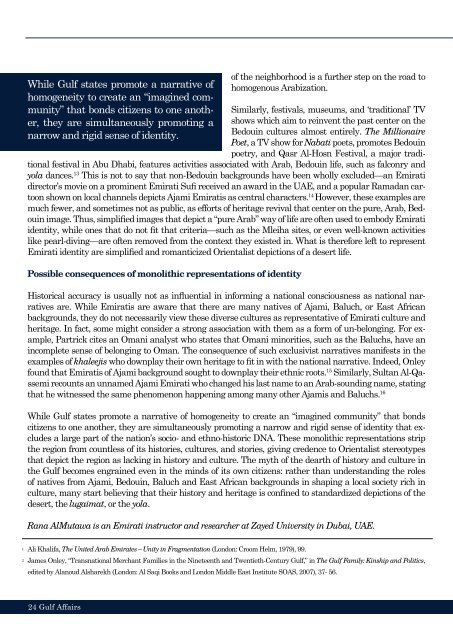Create successful ePaper yourself
Turn your PDF publications into a flip-book with our unique Google optimized e-Paper software.
While Gulf states promote a narrative of<br />
homogeneity to create an “imagined community”<br />
that bonds citizens to one another,<br />
they are simultaneously promoting a<br />
narrow and rigid sense of identity.<br />
of the neighborhood is a further step on the road to<br />
homogenous Arabization.<br />
Similarly, festivals, museums, and ‘traditional’ TV<br />
shows which aim to reinvent the past center on the<br />
Bedouin cultures almost entirely. The Millionaire<br />
Poet, a TV show for Nabati poets, promotes Bedouin<br />
poetry, and Qasr Al-Hosn Festival, a major traditional<br />
festival in Abu Dhabi, features activities associated with Arab, Bedouin life, such as falconry and<br />
yola dances. 13 This is not to say that non-Bedouin backgrounds have been wholly excluded—an Emirati<br />
director’s movie on a prominent Emirati Sufi received an award in the UAE, and a popular Ramadan cartoon<br />
shown on local channels depicts Ajami Emiratis as central characters. 14 However, these examples are<br />
much fewer, and sometimes not as public, as efforts of heritage revival that center on the pure, Arab, Bedouin<br />
image. Thus, simplified images that depict a “pure Arab” way of life are often used to embody Emirati<br />
identity, while ones that do not fit that criteria—such as the Mleiha sites, or even well-known activities<br />
like pearl-diving—are often removed from the context they existed in. What is therefore left to represent<br />
Emirati identity are simplified and romanticized Orientalist depictions of a desert life.<br />
Possible consequences of monolithic representations of identity<br />
Historical accuracy is usually not as influential in informing a national consciousness as national narratives<br />
are. While Emiratis are aware that there are many natives of Ajami, Baluch, or East African<br />
backgrounds, they do not necessarily view these diverse cultures as representative of Emirati culture and<br />
heritage. In fact, some might consider a strong association with them as a form of un-belonging. For example,<br />
Partrick cites an Omani analyst who states that Omani minorities, such as the Baluchs, have an<br />
incomplete sense of belonging to Oman. The consequence of such exclusivist narratives manifests in the<br />
examples of khaleejis who downplay their own heritage to fit in with the national narrative. Indeed, Onley<br />
found that Emiratis of Ajami background sought to downplay their ethnic roots. 15 Similarly, Sultan Al-Qassemi<br />
recounts an unnamed Ajami Emirati who changed his last name to an Arab-sounding name, stating<br />
that he witnessed the same phenomenon happening among many other Ajamis and Baluchs. 16<br />
While Gulf states promote a narrative of homogeneity to create an “imagined community” that bonds<br />
citizens to one another, they are simultaneously promoting a narrow and rigid sense of identity that excludes<br />
a large part of the nation’s socio- and ethno-historic DNA. These monolithic representations strip<br />
the region from countless of its histories, cultures, and stories, giving credence to Orientalist stereotypes<br />
that depict the region as lacking in history and culture. The myth of the dearth of history and culture in<br />
the Gulf becomes engrained even in the minds of its own citizens: rather than understanding the roles<br />
of natives from Ajami, Bedouin, Baluch and East African backgrounds in shaping a local society rich in<br />
culture, many start believing that their history and heritage is confined to standardized depictions of the<br />
desert, the lugaimat, or the yola.<br />
Rana AlMutawa is an Emirati instructor and researcher at Zayed University in Dubai, UAE.<br />
1<br />
2<br />
Ali Khalifa, The United Arab Emirates – Unity in Fragmentation (London: Croom Helm, 1979), 99.<br />
James Onley, “Transnational Merchant Families in the Nineteenth and Twentieth-Century Gulf,” in The Gulf Family: Kinship and Politics,<br />
edited by Alanoud Alsharekh (London: Al Saqi Books and London Middle East Institute SOAS, 2007), 37- 56.<br />
24 Gulf Affairs


